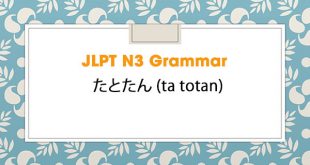など/なんか/なんて (nado / nanka / nante) Meaning: like~ (usually used to list negative examples) How to use the: Noun + など/なんか/なんて Explain: Use when you want to give an example to slightly, low hit rating. Use when saying negative, or disregard one thing is not very important. Example sentences: 1, …
Read More »Grammar
JLPT N3 Grammar: でさえ (de sae)
でさえ (de sae) Meaning: even; not even How to use the: N + でさえ Explain: Take an extreme example and conclude others (at a lower level) are natural Example sentences: 1, 先生でさえ分からないのだから、私には無理でしょう。 Senseide sae wakaranai nodakara, watashiniha murideshou. Even the teachers did not understand, then I also bear 2, そんなことは小学生でさえ知ってるよ。 …
Read More »JLPT N3 Grammar: てしょうがない (te shouganai)
てしょうがない (te shouganai) Meaning: Can’t help; can’t be helped How to use the: Verb-てform + しょうがない いadj(-い)くて + しょうがない なadj + でしょうがない Explain: can’t stand it, don’t know what to do, too ~ (uncontrollably) Example sentences: 1, 今日は暑くてしょうがない。 Kyō wa atsukute shouganai. It’s unbearably hot today 2, 彼に会いたくてしょうがない。 Kyō wa …
Read More »JLPT N3 Grammar: てしかたがない (~て仕方がない) te shikata ga nai (te shikata ga nai)
てしかたがない (~て仕方がない) te shikata ga nai (te shikata ga nai) Meaning: Can’t help; can’t be helped Explain: The description was unbearable, don’t know what to do, too ~ (uncontrollably) Example sentences: 1, 公園で出会って以来、彼女のことが気になってしかたがない Kōen de deatte irai, kanojo no koto ga ki ni natte shikata ga nai Ever since meet …
Read More »JLPT N3 Grammar: っこない (kkonai)
っこない (kkonai) Meaning: no chance of; …is definitely not possible; absolutely no ~, certainly not ~ How to use the: Verb-ますstem + っこない Verb-potential stem + っこない Explain: “Certainly not, it cannot happen”. This sentence pattern is used to emphasize the inability. Often not used in formal situations. Example sentences: …
Read More »JLPT N3 Grammar: ばかりに (bakari ni)
ばかりに (bakari ni) Meaning: Just because ~; simply because How to use the: Verb-casual, past + ばかりに Noun + (である)ばかりに なadjective + な/である + ばかりに いadjective + ばかりに Explain: Describe something that is the cause of bad results. Express dissatisfied mood, regret Example sentences: 1, 働きがないばかり、友達に馬鹿にされている。 Hataraki ga nai bakari, …
Read More »JLPT N3 Grammar: たとたん (ta totan)
たとたん (ta totan) Meaning: as soon as; just as; the moment; the instant; just (now, at the moment) How to use the: Verb (casual, past) + とたん Explain: Describe the situation after the action, the change that happened before that immediately after that the action or other change happened again …
Read More »JLPT N3 Grammar: つもりで (tsumori de)
つもりで (tsumori de) Meaning: with the intention of doing How to use the: Verb-casual, past + つもりで Verb-dictionary form + つもりで なadjective + なつもりで Noun + つもりで Explain: This sentence pattern is used to describe an action that will be done or an intention but is not certain or has …
Read More »JLPT N3 Grammar: にすぎない (ni suginai)
にすぎない (ni suginai) Meaning: no more than; just; merely; only How to use the: Noun + にすぎない Explain: V普通形/N+にすぎない Example sentences: 1, 彼は政治家ではなく、たんなる官僚に過ぎない。 Kare wa seijikade wa naku, tan’naru kanryō ni suginai. He is not a politician, he is just an official 2, 日30分ランニングをしたにすぎないが、1ヶ月で5キロもやせた。 Hi 30-bu ran’ningu o shita ni …
Read More »JLPT N3 Grammar: にかぎる~ (~に限る) ni kagiru (ni kagiru)
にかぎる~(~に限る) ni kagiru (ni kagiru) Meaning: nothing better than; there’s nothing like; is best How to use the: Verb-casual, non-past + に限る/にかぎる Noun + に限る/にかぎる Explain: Usually used with なら ,たら on the front Example sentences: 1, 疲れた時は温泉に行くにかぎねる。 Tsukareta toki wa onsen’niiku ni kagi neru. When you’re tired, taking a …
Read More » Learn Japanese Free Learn Japanese Free
Learn Japanese Free Learn Japanese Free










